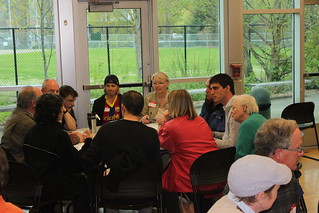
Most good Alpha training for future Table Hosts (think “facilitators”) covers how to adapt to challenging situations, i.e. a guest who dominates conversation, or guests who give off-topic responses to questions. But for many running Alpha in a Catholic Context, full of Catholic parishioners, there can be a challenge when a local culture one might describe as “intellectual,” “doctrinal,” or “didactic” exists.
When that’s the local parish culture, coaching Alpha Hosts to say, “thanks for sharing, but this isn’t the place for theological discourse,” can seem tempting. But, if that’s the culture one is operating in, and trying to transform through the Alpha experience, then “closing down” that conversation doesn’t create space for that transformation to happen.
The keys to a great Alpha discussion are love, listen, and laugh. Catholics seeped in an overly intellectual/doctrinal/didactic culture are just as much in need of loving, listening, and laughter as everyone else (um, if not more!).
How to respond at an Alpha Table?
Here’s a helpful sample of reply ideas for when someone raises a theological/doctrinal/catechetical objection or intellectual comment to a point in the episode…
1) Hmm…what do you all think? [this gives the Table as a whole a free opportunity to serve as the “peer corrective”]
2) [If no responses, try and draw it out more.] Do you agree that “xyz” is not true? Or, do you believe it is true?
The emphasis on “true” here is deliberate; we don’t want the conversation to be on what’s “Catholic” or “not Catholic,” because what matters is if “xyz” is true. All things true are going to be part of the fullness of the faith anyway 😉 There’s nothing in Alpha we don’t want Catholics to believe, and so if some Catholics don’t find messages or key points in Alpha true based on their experience and formation, then that kind of shows us where we’re at and why we’re doing this
3) Does anyone have a sense of why “xyz” matters for you personally?
This gives the opportunity for those formed in an overly-intellectual/didactic Catholic culture to reflect personally, to see doctrine not as the “end” but as lights that guide us in our relationship with Jesus.
4) How do you feel about the idea that “xyz”?
This creates the space for those at the table to “disagree” or express discomfort without having to say it so bluntly–something that would be culturally foreign in an overly-intellectual/didactic culture.
The hope would be that through these questions the “xyz” doctrine in question would be fleshed out by the guests, and they’d have the opportunity to reflect on if they believe it and what it means to them. While Alpha is normatively designed and run among seekers and non-believers, when it’s used in a Catholic culture, we want Catholics to have that same experience of reflecting on beliefs and what those beliefs mean to them.

Thanks for highlighting the need to not just dismiss the doctrinal/intellectual responses. This will help me train my team. One question I use in similar circumstances is, “How would you explain ‘xyz’ to a non-Christian?” I think this question helps a person understand the concept and not just rely on the familiar, insider vocabulary we use to talk about the Catholic faith. When we are forced to translate insider language to outsider language, we have to dig deeper into our understanding.
LikeLiked by 1 person
Yes! That is a great technique.
I saw this happen during a training role-play, where a person asked that gently for someone who was talking about Adoration…and once they thought about it, they were able to rephrase how Adoration connects them to God in prayer by talking about the need for silence, focus, etc. in their busy life. It was fantastic to see!
LikeLike